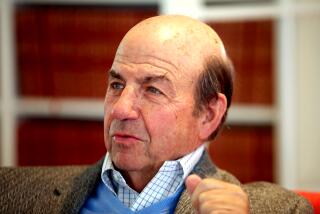AN OLD-SCHOOL EDITOR KEEPS NBC UP TO DATE
- Share via
NEW YORK — He pictured himself as a body of very old men sitting around in a small room near to buried in books, papers and dust, guarding the language with a dirk held in trembling fingers .
--From “God and Harvey Grosbeck” by Gilbert Millstein.
Gil Millstein is a news editor and a novelist. His daily exercise consists of mulling and grumbling. He hates trendy cafes where neon is the main course. He despises reporters who use phrases like “a troubled economy.” He calls life “a series of small indignities.”
Alas, despite his passable imitation of a curmudgeon, his gripes tend to have a twinkle to them. His manner is that of a crusty, yet kindly con man whose greatest joy is that he has flimflammed Father Time.
Come to think of it, though, Millstein has done just that. The TV news game may be the province of the young and the middle-aged, but Millstein, 70, is still in it.
He’s the news editor at “NBC Nightly News”--its straightener of syntax, custodian of accuracy and guardian of language and clarity. He’s been all that for the last 10 years.
He works alongside Tom Brokaw. The anchorman says Millstein can be a pain at times, “but he’s peerless. And the man is absolutely encyclopedic in his knowledge.”
“It’s a thankless job, as many editors may have told you,” editor Millstein says in the tones of pain, anguish and furtive enjoyment one so often hears from editors.
That he is held in high regard by Brokaw and others was indicated last year when he reached 70, normally the mandatory retirement age at NBC. He wanted to keep working, “creature of habit that I am.” Brokaw & Co. went to bat for him. Permission granted.
“It was with a real sense of urgency that we had to get this done,” Brokaw says. “The SALT talks are one thing. Not to have Millstein here is another. So we went to the summit and worked out something.”
Millstein has been in journalism since 1935 when, while in college, he became a copy boy at the New York Herald Tribune. He took his time getting into television news: He waited until he was 50. He also took his time becoming an author.
He didn’t write his first novel, “The Late Harvey Grosbeck,” until he was 59. He was 68 when his second, “God and Harvey Grosbeck,” was published. The style of each, like his speech, resembles a cross between S. J. Perelman and Nathanael West.
Sardonic celebrations of life, each novel concerns an urbane, dour, 60-year-old New York newspaper copy editor. In Book Two, editor Grosbeck suffers a heart attack while decrying such cliches as “viable alternative.” After his recovery, his woes worsen: He is promoted to editorial writer, objecting all the way.
So troubled is he by his lofty new post and the blight of urban progress--a process his paper supports, naturally--that he briefly consults a psychiatrist. It does no good, even though the shrink’s calling card says: “Subspecialty: People over 40 who wonder what happened.”
Some say Grosbeck resembles Millstein, if only because both have long been under doctor’s orders not to smoke, and are agonized by it. Grosbeck always keeps an emergency cigarette somewhere, “like an Indian down to his last chew of pemmican in a blizzard.”
However, during a recent interview, Millstein just gazed wistfully at a cigarette that a reporter was smoking as both interviewer and interviewee sat in Millstein’s Greenwich Village apartment, discussing the latter’s life, times and television.
Early on, the editor-author called out to his wife, Barbara, an associate curator at the Brooklyn Museum. “Come sit with us,” he said, “and you can jog what remains of my memory.”
She demurred, contending he was doing fine solo. Millstein shrugged. He said his first reporting job was in Rutland, Vt. Some New Yorkers might call that the sticks. Not he: “I had two of the best years of my life in Rutland. True, there were no bright lights up there. But there was a girl named Nickles Pickles. The people were decent beyond the call of duty. And I learned to report.”
He next went to the Philadelphia Ledger, run by Stanley Walker, the legendary editor from New York. The paper folded three years later. Millstein moved on to four years at the New York Daily News as a rewrite man and feature writer. As the latter, he covered three executions.
Two jobs later, he signed on with the Sunday section of the New York Times. There he profiled stars as diverse as Julie Andrews and Lenny Bruce, reported on matters ranging from Coney Island to Brooks Brothers, and reviewed a book now and then.
(He still is remembered as the critic whose salute to Jack Kerouac’s “On the Road” propelled both Kerouac and his beat-generation beatitudes from limbo to limelight.)
He also did some op-ed page writing. In his spare time, he argued with Sunday editor Lester Markel. After 13 years, he had what he calls “a final falling-out” with Markel and decamped to the Saturday Evening Post for what proved a short stay.
Finally, in 1965, he joined television, signing on as a writer with NBC News on “The Huntley-Brinkley Report.”
He arrived with the natural scorn of the man of print for the inmates of electronics. He felt that “television couldn’t possibly transmit the news to people, that it was careless, that it didn’t have too much respect for fact, that it was superficial.”
He has come to believe that he was wrong, he says, at least about network news. He reserves his fulminations for local TV news, the New York kind: “It is an abomination. It is, on the whole, staffed by people who cannot report, cannot write, cannot gather facts and are generally unfamiliar with the city in which they are working.”
It makes him uneasy that network news at times has the whiff of show biz--”elaborate electronic graphics, odd sets and a great deal of irrelevant gee-whiz.” However, he has found that network news, on balance, “has attempted mightily to gather the news honestly, evenhandedly, and as thoroughly as it can. . . . “
Aware that the heavens may part and his print colleagues may hoot, he also submits that his work at NBC has improved even his writing, greatly aided the creation of his two novels and “New York,” a nonfiction book he also wrote after joining the network.
“Nothing taught me so much as television writing,” says Millstein. “It taught me not fake economy but genuine economy. And it taught me to follow an injunction of Stanley Walker’s. He said that what’s important in a story are ‘the little leaping verbs.’ ”
Millstein wrote both of his novels at his NBC office in midtown Manhattan. His routine was to arrive there at the ungodly hour of 3:30 a.m., tussle with the muse for several hours, catch a quick nap and then arise and read the New York Times.
After that, he would start the day’s work for NBC News.
He is not quite sure what prompted him to write the novels. He thought about it a moment. “No, wait, I think there’s a very good reason for it. (With) fiction, you don’t have to get up and go anywhere.”
He shrugged when asked what propelled him into network television. “It would take Freud to explain it, and that wouldn’t help either.”
The evidence points to a pal, Robert (Shad) Northshield, also an ex-newspaperman. Northshield now runs “CBS News Sunday Morning,” but he was at the helm of NBC’s “Huntley-Brinkley Report” when Millstein went to that show and television.
Consider a pertinent passage from the last page of “God and Harvey Grosbeck.” In it, Grosbeck has achieved dubious fame, having been bounced from his paper for furtively changing an editorial that supported what he considered an architectural abomination.
He receives a call from the producer of a TV news program. The gentleman’s name is Brad Northfield. No relation to Shad Northshield, of course.
“Have you ever thought of going into television?” There was silence at Grosbeck’s end of the line. “You still there?” Northfield asked.
“I’m here,” Grosbeck said.
“I’m asking you, have you ever thought of going into television?”
“No,” said Grosbeck. “I despise television, television news in particular.”
“No surprise,” Northfield said. “That’s why I’m calling you. How would you like me to take you out of the abyss whence you have been cast?”
More to Read
The complete guide to home viewing
Get Screen Gab for everything about the TV shows and streaming movies everyone’s talking about.
You may occasionally receive promotional content from the Los Angeles Times.






